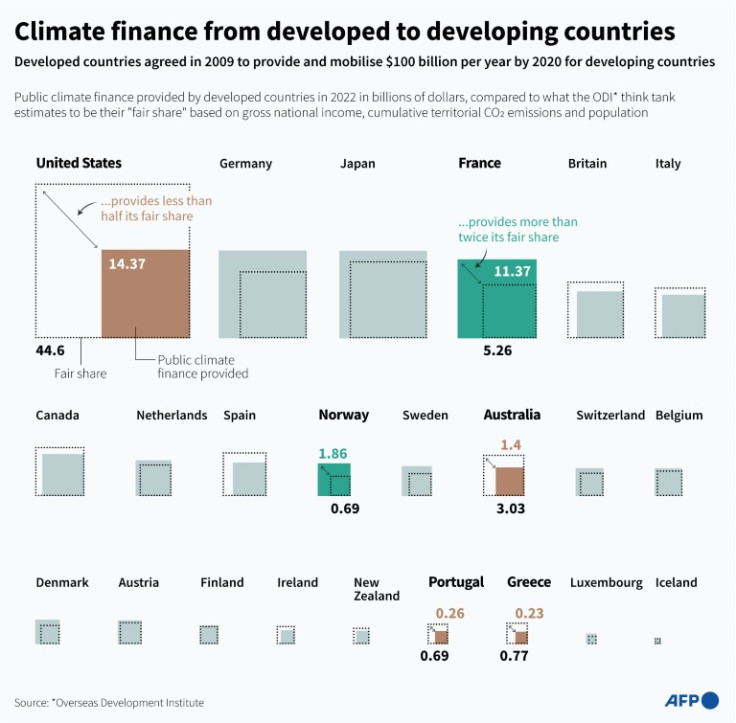Nations Race To Land Climate Deal As COP29 Draft Rejected

Negotiators raced against the clock at UN climate talks Thursday to broker a trillion-dollar deal to help poorer nations tackle global warming after rich and developing countries roundly rejected a draft deal.
The UN climate summit is supposed to conclude on Friday but is almost certain to run into overtime as nations from the United States to China panned the latest draft released by the Azerbaijani hosts.
The main priority at COP29 in Baku is agreeing a new target to replace the $100 billion a year that rich nations provide poorer ones to reduce emissions and adapt to disaster.
Developing countries plus China, an influential negotiating bloc, are pushing for $1.3 trillion by 2030 and want at least $500 billion of that from developed nations.
The latest draft recognised that developing countries need at least "USD [X] trillion" per year but omitted a concrete figure.
"There is a critical piece of this puzzle missing: the overall number," said Cedric Schuster, the Samoan chairman of the Alliance of Small Island States, a coalition of nations at threat from rising seas.
"The time for political games is over."
"This is the reason we are here," said Mohamed, who is also Kenya's climate envoy.
A shorter, revised draft expected Thursday evening would "contain numbers", COP29 hosts Azerbaijan said.
"We need a major push to get discussions over the finishing line," UN Secretary-General Antonio Guterres said.
"Failure is not an option."
China, the world's largest emitter, said the text was "not satisfactory" but urged "all parties to meet each other halfway".
Other major sticking points -- including who contributes climate finance and how the money is raised and delivered -- were left unresolved in the text.
Apart from splits over money, many nations said the draft failed to reflect any urgency on phasing out coal, oil and gas -- the main drivers of global warming.
"We are, frankly, deeply concerned at this stage about what we view as a glaring imbalance in the text thus far," US climate envoy John Podesta said.
The text's sections on cutting planet-warming emissions were "absolutely unacceptable", he added.
Australian climate minister Chris Bowen said countries had "hidden, pared back or minimised" references to fossil fuels, calling it "a big step back".
Saudi Arabia, speaking on behalf of the Arab Group, said it would "not accept any text that targets any specific sectors, including fossil fuel".
As the clock ticks down, frustration in Baku boiled over at the COP29 hosts.
"Could I please -- could I please -- urge you to step up the leadership?" EU climate commissioner Wopke Hoekstra said in pointed remarks.
"I'm not going to sugarcoat it. I'm really sorry to say, but the text we now have in front of us -- in our view -- is imbalanced, unworkable and unacceptable."
COP29 lead negotiator Yalchin Rafiyev appealed for "compromise and solidarity".
"This is a moment where you need to put all your cards on the table," he told delegates, stressing there was "a long way to go".
Ireland's climate minister Eamon Ryan insisted negotiations were "advancing" behind the scenes and the final text will be "radically different" from the draft.
"I think there is room for further agreement," he told AFP.
Norway's climate minister Tore Sandvik also offered a rosier take: "The deadline isn't here yet," he told AFP.
The draft entrenches the broad and opposing positions of developed and developing countries on the finance goal that have largely persisted since COP29 opened over a week ago.
Developed countries want all sources of finance, including public money and private investment, to count.
They also want newly-wealthy countries and major emitters not obligated to pay -- like China -- to chip in.
Developing countries, meanwhile, want finance mostly from the government budgets of richer nations in the form of grants or funds without strings attached.
Presently, most climate finance is issued as loans, meaning developing nations incur more debt as they build resilience against global warming.
The EU and the US, two of the biggest contributors, have refused to put forward a figure until other details of the pact are ironed out.

© Copyright AFP 2025. All rights reserved.





















